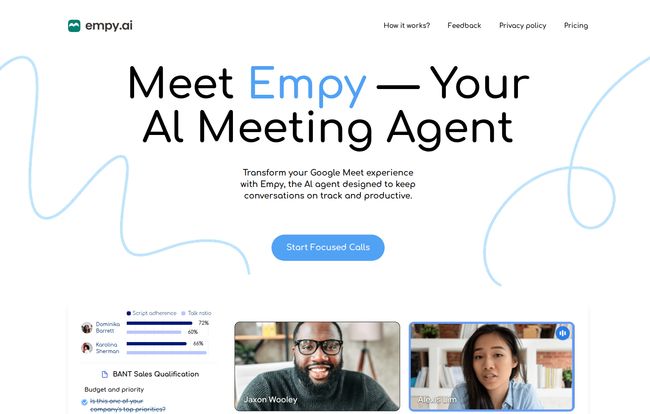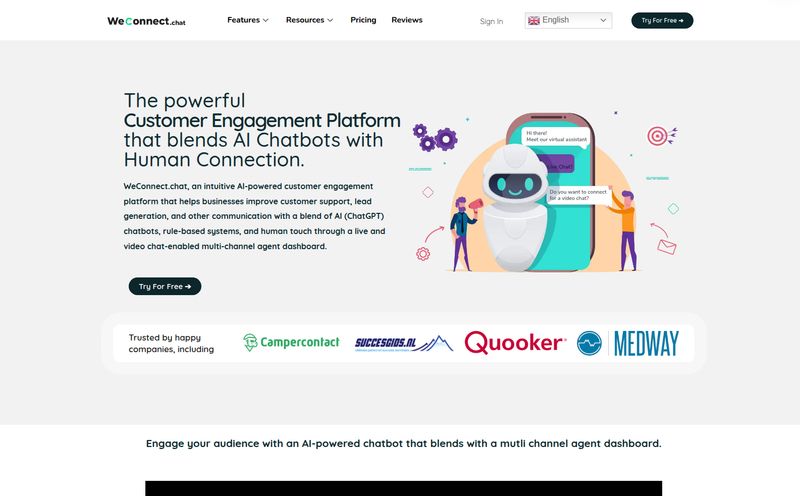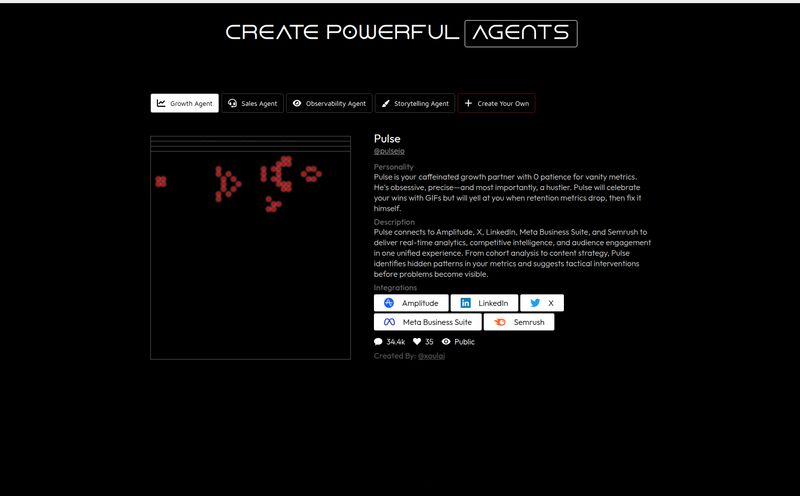We’ve all been there. It’s 3:45 PM on a Tuesday, and you’re in your fourth back-to-back Google Meet. Someone is droning on about a topic that was settled 20 minutes ago, another person is clearly answering emails, and the original point of the meeting is a distant, forgotten memory. You start to wonder if this is your life now. Just an endless series of little boxes on a screen, talking in circles.
It’s a problem. A huge one. A problem that costs companies billions in lost productivity, but more importantly, it slowly erodes team morale until everyone secretly dreads seeing that calendar invite pop up. For years, we've tried to fix this with better agendas, time-boxing, and a million other manual techniques. But what if technology could give us a nudge in the right direction?
I’ve tested a lot of AI meeting tools. Most of them are glorified transcription services with some fancy keyword summaries. Useful, sure, but they dont solve the root problem: human behavior. But recently, I stumbled upon a tool called Empy.ai, and I have to admit, it feels… different.
So, What Exactly is Empy?
Let's get one thing straight: Empy isn't just another note-taker. It bills itself as an “AI Meeting Agent,” which sounds a bit like something out of science fiction. In practice, it’s a clever combination of a Slack bot and a Chrome plugin designed to work with Google Meet. Its goal isn't just to record what was said, but to actively improve the quality of the conversation as it happens.
The secret sauce here is a blend of GPT-4 and a methodology called Nonviolent Communication (NVC). If you haven't heard of NVC, it's a communication process developed by Marshall Rosenberg that focuses on expressing needs and feelings without blame or criticism. Think of Empy less as a stenographer and more as a friendly, but firm, meeting moderator sitting on your shoulder, whispering reminders to stay on topic and maybe, just maybe, be a little kinder to your colleagues.

Visit Empy
The Features That Actually Caught My Eye
A feature list can be boring, so let’s talk about the parts of Empy that made me sit up and pay attention. These aren't just bullet points on a pricing page; they're thoughtful solutions to real-world meeting pains.
More Than Just an Agenda-Bot
The most basic function of Empy is keeping your meetings focused. You set an agenda, and if the conversation starts to drift—say, your weekly marketing sync suddenly becomes a debate about the new Star Wars series—Empy gently flags it. It pops up a little warning that you've deviated from the main topic. It’s not obnoxious, but it's present enough to make everyone pause and ask, “Right, what were we supposed to be talking about?” This alone could probably cut meeting times by 25% for some teams I know.
The Empathy Engine with NVC in Slack
This is where things get really interesting. The Empy Slack bot can analyze your team’s messages and, using NVC principles, suggest more empathetic ways to phrase things. It’s like having a communications coach on standby. For example, a blunt message like, “That report is late and it’s holding everyone up,” could be rephrased by Empy into something like, “I’m feeling concerned about the project timeline. Could you give me an update on the report when you have a moment?” It’s a subtle shift, but one that can defuse tension before it even starts. In a remote-first world where tone is so easily lost in text, this is a seriously powerful concept.
Customization That Actually Matters (Hello, Neurodiversity!)
Here’s the part that truly impressed me and, frankly, shows a level of thoughtfulness I don’t see in most SaaS tools. Empy allows for customization based on individual user preferences, including specific settings for conditions like ADHD and Dyslexia. This is huge. A team member with ADHD might struggle with losing concentration in long meetings. Empy can be configured to provide them with more frequent reminders or summaries to help them stay engaged. This isn’t just about productivity; it’s about creating a more inclusive and supportive work environment. It’s a recognition that not everyone’s brain works the same way, and our tools should adapt to us, not the other way around.
The Post-Game Analytics
After your meeting, Empy provides a dashboard of analytics. This isn’t just a transcript; it’s a breakdown of the meeting's health. You can see stats like the talk ratio (who dominated the conversation?), script adherence for sales calls, and even a summary of the general mood. For a manager, this is gold. It’s objective data that can help you coach your team. You can see if one person is consistently talking over others or if certain topics always derail the conversation. It’s like watching game tape for your meetings.
My Honest Experience: The Good and The Not-So-Good
No tool is perfect, right? After playing around with Empy, I've got some pretty clear takeaways on where it shines and where you might hit a few bumps.
On the upside, the potential to foster healthier, more focused communication is immense. For teams that are struggling with unproductive meetings or passive-aggressive Slack channels, Empy could be a genuine circuit breaker. The NVC-powered suggestions and the off-topic alerts are practical tools that can create real change. The analytics provide concrete insights that are far more valuable than just a gut feeling that “meetings are bad.” And I can't say enough good things about the neurodiversity features—its a genuinely forward-thinking addition.
However, there are hurdles. The biggest one is team adoption. Empy is only as effective as the team using it. If people see it as “management spying” or just another annoying notification to ignore, it will fail. It requires a cultural buy-in. You have to introduce it as a tool to help everyone, not to police them. There's also the initial “ick” factor of an AI “listening” to your calls. While Empy states they use end-to-end encryption and local processing to protect data, there's still a psychological barrier for some people to overcome. Its a surprisingly simple idea, but the execution is what matters.
Who is Empy Really For?
The website says it’s perfect for leaders, product managers, and project managers, and I agree. Anyone whose job involves corralling people and ideas will see the value immediately. I’d also add sales managers who need to ensure their reps are sticking to scripts and remote team leads who are trying to build a positive communication culture from a distance.
Who is it not for? Probably very small, informal teams who have a great, natural flow to their meetings already. Or, for teams that are deeply resistant to any form of process or structure. You have to want to improve your meetings for a tool like this to work.
The All-Important Question: What's the Price?
This is often the dealbreaker, but Empy has kept it refreshingly simple. There's one plan:
- $9 per user, per month
- $108 per user, if you pay for a full year
That’s it. No complicated tiers. The plan includes call monitoring, reminders, and the stats dashboard. They also offer a 7-day free trial with no credit card required, which is always a good sign. In my opinion, the price is more than fair. If Empy saves you from just one or two wasted hour-long meetings a month, it has already paid for itself. It’s the classic “less than a few cups of fancy coffee” argument, and in this case, it holds up.
Final Thoughts: Is Empy a Gimmick or a Game-Changer?
So, what's the final verdict? Empy is not a magical silver bullet that will instantly fix a toxic work culture. A tool can’t do that. That’s a human problem.
But what it can do is act as an incredibly useful set of guardrails. It's a nudge. A prompt. A data point. It’s a tool that forces a moment of mindfulness into our chaotic digital workdays. It addresses the human side of meetings—the distractions, the egos, the misunderstandings—in a way that most productivity software simply ignores.
Remember that awful meeting we talked about at the beginning? Empy might not have stopped it from being scheduled, but it could have kept it on track, softened a few harsh words, and given the manager the data needed to prevent the next one from becoming a sequel. And for that reason, I'm genuinely optimistic about it. It’s one of the most interesting applications of AI for team collaboration I’ve seen in a while.
Frequently Asked Questions about Empy.ai
- Does Empy record my meetings?
- Empy focuses on real-time analysis rather than full recording for playback. It analyzes the conversation to provide live feedback and post-meeting stats, and its privacy policy emphasizes end-to-end encryption and local processing to keep your data secure.
- What platforms does Empy work with?
- Currently, Empy integrates with Google Meet via a Chrome plugin and with Slack via a dedicated bot. This covers two of the most common platforms for team collaboration.
- Is it hard to set up?
- The setup involves adding a Chrome extension and integrating a bot into your Slack workspace. Like any new tool, there's a small setup process, but it's designed to be straightforward. The biggest lift is getting your team on board with using it consistently.
- What is Nonviolent Communication (NVC) anyway?
- NVC is a communication framework that focuses on three things: observing without evaluating, identifying and expressing feelings, and making requests instead of demands. The goal is to foster compassion and collaboration. Empy uses this framework to guide its empathetic suggestions.
- Can I customize the alerts and features?
- Yes. A key feature is the ability to customize preferences, particularly for users with ADHD or Dyslexia, to make the tool more helpful and less intrusive based on individual needs.
- Is there a free version of Empy?
- There isn't a permanent free-forever plan, but Empy offers a 7-day free trial that gives you full access to all its features so you can test it with your team before committing.



